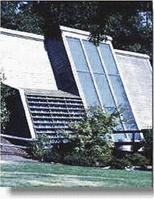Patricia Isaacs-Green is thinking about introducing solar panels at her new home in St Mary. The owner of Green Produce Farms in Claremont, St Ann, who has seen enormous savings by running a 100 per cent solar farm, is preaching solar to everyone.
Isaacs-Green started the farm in 2004 with 100 per cent solar powering. It cost her, at the time, US$40,000 to do it.
She reflects, "(I) used to be the MD at McDonald's and I kept watching the great amount of money for JPS (Jamaica Public Service) bills and I knew that things were not heading in right direction. We were also very much into energy conservation at McDonald's. I started looking for an alternative."
Since starting her own commercial venture four years ago, she says it has become apparent that she made the right decision in installing solar panels and a diesel-run generator.
"I laugh and smile. We now spend just $20,000 a month for the backup generator each month. My residence JPS bill is more than that. At home it's just me and my 88-year-old mother, but the last bill was $23,000."
access a homeowner's loan
Jamaicans can access a homeowner's loan from the National Housing Trust (NHT) to install solar panels for energy conservation in their homes. Single applicant may qualify for up to $1.2 million while co-applicants may get $2.4. The maximum repayment period is 15 years.
For solar water heaters, the loan amount from the NHT is $100,000 at five per cent for five years.
For a contributor age 37 who is a current (non-NHT) homeowner, who has been contributing to the trust for over a decade, (yes, all these factors are relevant), and who earns gross monthly salary of $50,000, the monthly payback for $1.2 million for solar panel installation is $11,700 monthly, at six per cent, for 15 years.
One can also make lump sum payments to reduce the principal amount owed at any time. But, how much solar power can this money buy you, and will it really reduce your energy costs?
According to Damien Lin of Alternative Power Sources in Kingston, it depends on how much energy you use.
"People's living habits vary, so a two-bedroom house might attract rates between $2,000 and $10,000 per month in relation to usage.
"We would have to do what is called an electrical consumption audit first. And while kilowatt usage might be 500 kilowatts each month, it does not indicate how much of that is light, the intensity of usage, length of usage, what kinds of bulbs are being used, etc. An audit will correctly determine your needs and pattern of usage. It will also indicate what size our battery bank should be in the case of a power outage."
photovoltaic modules
Most alternative power systems, Lin says, are now battery-based, replacing the generator with its expensive oil demands. Solar panels are used to charge these batteries. Solar panels are photovoltaic modules which produce electrons via sunlight.
Light shines on these cells and generates electrons which, in turn, provide electrical power. Each panel is limited by the wattage it provides and may very from as little as 75 watts to much more.
The average wattage system installed in Jamaica is a 1.2 kilowatt system, which provides 840 watts per sun peak hour, or 6,920 watts during six to eight hours.
UTILISING THE hybrid system
Such a system is enough to run a small refrigerator (15 cubics), house lights and bedroom ceiling fans. Basically, the run time of equipment depends on the battery storage and weather conditions, which cause a day-to-day variance.
In most cases, Jamaican residential consumers use their solar panels as backup to the JPS-provided power system in their homes. Most do not have the money for a full system.
The farm owned by Isaacs-Green is one example of an entity which is completely off the JPS power grid. Green Produce Farms utilises a hybrid system of photovoltaic cells and diesel generator.
Once the battery panels go below a certain voltage, the signal is given to release power, but during the day when the sun is again up the signal is given form the change back to solar. This limits the run time on the diesel generator. If a normal generator runs for 12 hours, this system will cut usage to around six hours.
Patricia Isaacs-Green notes that the price of oil has reached US$127 a barrel, and that by the end of quarter, it could be US$145 per barrel.
"Its awful for business, especially those who need air conditioning."

Solar house

